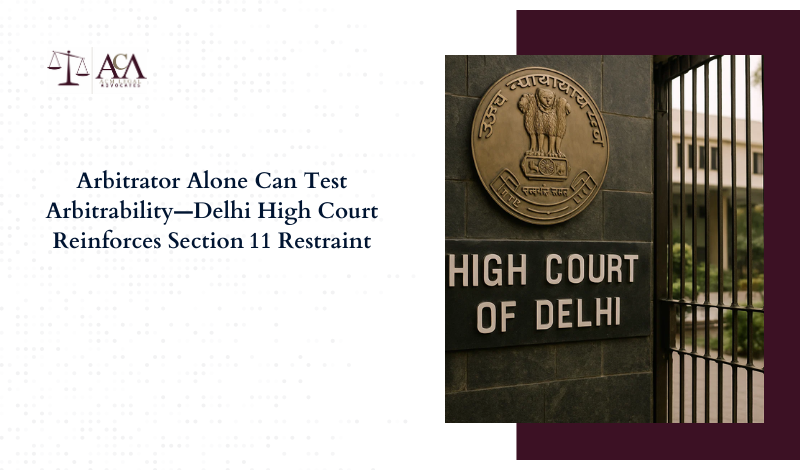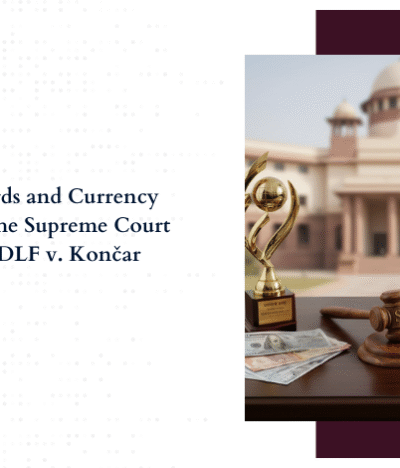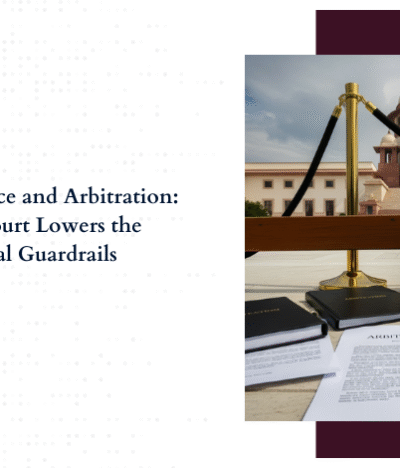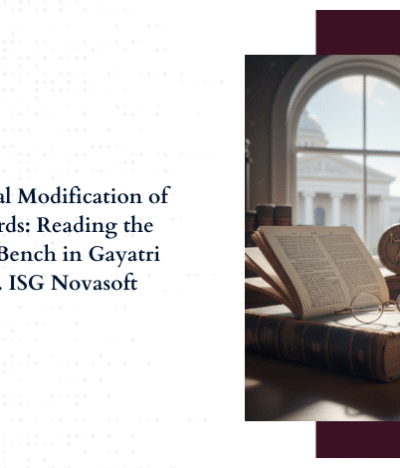Introduction
The Delhi High Court has reaffirmed that the power to determine whether an arbitration clause applies to a dispute lies squarely with the arbitral tribunal, not the court seized of a Section 11 petition. In Indraprastha Gas Ltd. v. Chintamani Food and Snacks (ARB.P. 355/2024, decision dated 29 November 2024), Justice Sachin Datta dismissed objections to the very “existence” of arbitrable disputes and proceeded to appoint a neutral sole arbitrator—holding that all deeper questions of validity, scope, and arbitrability must be left to the arbitrator under the competence‑competence principle.
Factual Matrix
- Gas Supply Agreement (GSA) – On 5 March 2018, the petitioner Indraprastha Gas Limited (IGL) agreed to supply piped natural gas to the respondent’s industrial unit. Article 23 of the GSA contained a tiered dispute‑resolution clause culminating in ad‑hoc, sole‑arbitrator arbitration seated in New Delhi.
- Shift to Pre‑paid Meter – From October 2020, the respondent migrated to a pre‑paid metering regime. A systems lapse meant the meter was not updated with successive tariff hikes between July 2022 – December 2022, allegedly producing an arrears figure of ₹3,50,638.33.
- Notice & Section 11 Petition – After failed demands (legal notice 26 September 2023) and a formal arbitration invocation (28 November 2023), IGL moved the High Court under Section 11(6) when the parties could not agree on a sole arbitrator.
- Respondent’s Objections – The respondent argued that (a) it always paid in advance, leaving no “live” dispute, and (b) migration to a pre‑paid model “displaced” Article 23. It therefore urged the Court to refuse appointment.
Threshold Issue Before the Court
The central question became whether, at the Section 11 stage, the Court may adjudicate:
- Existence of arbitrable dispute; and
- Continued applicability of the arbitration clause post‑migration.
Relying on recent Supreme Court clarifications in SBI General Insurance Co. Ltd. v. Krish Spinning and In re Interplay between the Arbitration Act and the Stamp Act—both of which cabin Section 11 scrutiny to a “prima facie” test—the High Court held that these contested merits issues are reserved for the arbitral tribunal.
Court’s Reasoning: Jurisdiction at Section 11 Stage is Narrow and Primafacie
Justice Sachin Datta emphasized the limited jurisdiction of a court entertaining an application under Section 11(6) of the Arbitration and Conciliation Act, 1996. The Court cannot act as a fact-finding tribunal or evaluate competing narratives about the “actual subsistence” of a dispute.
A. Primafacie Dispute Exists
The Court observed that IGL’s demand for ₹3,50,638.33, supported by documentary evidence and a legal notice, was not satisfactorily rebutted. Even if the respondent contended that all dues were prepaid, the underlying dispute around tariff revisions and system errors raised triable issues. Therefore, at least primafacie, the existence of a dispute was made out.
“The Court at this stage is only required to assess whether a dispute exists, not whether the claim is ultimately meritorious.” – Delhi High Court
B. Arbitration Clause Not Rendered Inapplicable
On the respondent’s claim that the pre-paid migration voided Article 23, the Court found no express novation or exclusion of the GSA terms. The mere operational change in billing method did not annul the arbitration clause.
“It cannot be said that the arbitration clause in the agreement was rendered inapplicable merely by reason of the respondent migrating to a pre-paid metering regime.” – Justice Sachin Datta
Thus, objections regarding non-applicability of the arbitration clause were questions of validity and scope, falling under Sections 16(1)(a) and (b) of the Act—firmly within the arbitrator’s domain under the kompetenz-kompetenz doctrine.
C. Supreme Court Precedents Applied
The Court relied on binding decisions, including:
- SBI General Insurance Co. Ltd. v. Krish Spinning Mills [(2023) 7 SCC 668]
- Vidya Drolia v. Durga Trading Corporation [(2021) 2 SCC 1]
- Interplay between Arbitration Act and Stamp Act [(2023) SCC OnLine SC 1666]
Each of these cases limits Section 11 powers to a primafacie test of arbitrability, especially when:
- There is a valid arbitration clause, and
- The dispute isn’t manifestly non-arbitrable on public policy or patent illegality grounds.
Hence, disputed facts, including whether dues were payable or whether GSA terms survived, had to be left to the arbitrator’s adjudication.
Final Order: Arbitrator Appointed Under Section 11
In view of the above reasoning, the Delhi High Court allowed the petition and appointed Justice (Retd.) Najmi Waziri as the sole arbitrator to adjudicate the dispute between Indraprastha Gas Limited and Chintamani Food and Snacks.
The Arbitrator was empowered to determine:
- Existence and quantum of any arrears;
- Effect of pre-paid metering on the GSA and arbitration clause;
- Any claims, counterclaims, and cost issues.
The arbitration proceedings were directed to be held in accordance with the Arbitration and Conciliation Act, 1996, and governed by the New Delhi International Arbitration Centre (NDIAC) Rules, seated in New Delhi.
Key Legal Takeaways
- Section 11 court cannot adjudicate the substance of disputes: Even where the respondent claims there is no live claim or the agreement was novated, such issues must be tested by the arbitrator.
- Existence of arbitration clause + prima facie dispute = appointment must follow: Unless the clause is manifestly invalid or barred by public policy, the court must refer the matter.
- Operational changes don’t displace arbitration clauses: Shifts in billing or contract management (like pre-paid migration) do not extinguish dispute resolution mechanisms unless expressly agreed.
- Kompetenz-Kompetenz doctrine upheld: The arbitrator alone is competent to rule on their jurisdiction, contract validity, or applicability of the arbitration clause.
Conclusion
This judgment by the Delhi High Court affirms the modern arbitration law principle that courts must resist evaluating the merits, scope, or applicability of arbitration agreements while deciding Section 11 petitions. By deferring such matters to the arbitrator, the decision furthers the legislative intent of minimal court intervention and party autonomy.
In a commercial landscape increasingly reliant on arbitration, this ruling is a reminder that judicial interference must be kept to a minimum—especially where prima facie disputes exist and an arbitration clause is on record.






